- Home
- Gerald Hammond
Sting in the Tail Page 9
Sting in the Tail Read online
Page 9
‘Your friend Mildred didn’t have any trouble with Clarence?’ I asked.
‘Losh no! Or if she did it was her own fault. She thinks he’s perfect. She gives him biscuits whenever he comes visiting. I’d be more likely than she would to take a swipe at the perisher.’
Mildred, I decided, was the one who needed something painful in the vicinity of the backside. I had the strongest objection to neighbours who encouraged my dogs to stray, unbalanced their diets and made them fat.
Mrs Bell was clearly one of those perfect informants, a born gossip, and I wanted to exploit her for all she was worth. ‘And the lady the other side?’ I enquired.
She raised her eyebrows, simulating amazement. ‘Smile when you call her a lady or folk may think that you’re serious. Mrs Postman Pat—’
‘Who?’
‘Mrs Haven. Her husband’s a postman in Dundee and his first name is Pat. And he really does look a bit like the children’s character, tall and thin with a blob for a nose. So naturally everybody calls him Postman Pat – except for those of us who call him Postman Prat, because he does have an exaggerated opinion of himself.’
Henry had been listening keenly but in silence. Now he was struck by the very point I had made to Charlie. ‘Rather an expensive area for a postman, isn’t it? New bungalows in exclusive cul-de-sacs aren’t exactly given away.’
‘I suppose it is,’ Mrs Bell said. ‘They only moved here a couple of years ago and I think he’d come down in the world, got a golden handshake or industrial compensation or something. She hinted that he was only working as a postman to keep himself occupied and his card stamped. But I really can’t bring myself to believe a word she says. She flaunts her body, flirts with every male between fourteen and seventy. When my husband was alive, she made advances to him every time they met. I didn’t really mind. All that she achieved was to light his fuse for me. And on most days, Mildred says, she disappears for an hour or two in her hideous little yellow car, so there’s probably a boyfriend somewhere. They have two cars, on a postman’s wage, would you believe? Not brand-new cars, but not very old either.’
Mrs Haven might be an interesting topic but we were straying from the point. Also Mrs Bell, despite her pretence at tolerance, was becoming heated.
‘Did she hold a grudge against Clarence for chasing her cat?’
‘I don’t think she gives a damn for any animal except herself, not even her own cat,’ Mrs Bell said. She sniffed. ‘She used to feed Clarence for Charlie Hopewell sometimes, but I’m sure that that was just to curry favour with a man. The nearest she came to showing an attitude to the dog was when he chased Mrs Brightley’s cat up a chimney and the fire brigade had to get it down again. Mildred saw her actually pat Clarence after that, once.
‘I don’t think that she’d have hurt Clarence. In fact, I’m surprised to hear that she was even at home at the time. Of course, Postman Pat might have been driving her car,’ Mrs Bell said obscurely. ‘I’d be more inclined to suspect the policeman in the house the other side of her of severus dorsus canis or whatever jargon the lawyers dream up for the offence.’
I pricked up my ears. ‘Would that be the policeman who came round with the SSPCA man?’ I asked her. From Charlie’s viewpoint, it would be useful if the investigating officer could be shown to have a motive for bias.
Her eyes widened. ‘I shouldn’t think so for a moment. He’s much too senior to be bothered with a little thing like an assault on a spaniel’s tail. But he’s very keen on his garden. He puts into it all the time and energy he can spare from solving murders and treason and company frauds, and more money than I could ever get out of Fred for the garden; and to do him justice, it’s becoming a showpiece. But he will put bone-meal round his roses so, of course, Clarence thinks there’s a bone buried beneath and he digs them up. Before now, I’ve heard Detective Chief Inspector McStraun with my own ears, threatening to take his hedge-clippers to Clarence. And not to his tail, either.’
I looked at Henry in surprise, to find that he was looking at me. We had met Detective Chief Inspector McStraun once before when the Tayside and the Fife constabularies had been collaborating on a murder case which had roots in both areas. He had seemed to be a placid man, not given to threats or to outbursts of temper. But at that time he had been on duty. Hell, I knew only too well, has no fury like a passionate gardener whose roses are being uprooted by a neighbour’s dog.
‘This is very helpful,’ I said. ‘You’re making the locals come alive for me. I don’t know whether it’ll help to solve the Mystery of the Mad Dog-Docker, or whether that mystery will ever be solved, but I feel I’ve got to try.’
The humour left her face. ‘I think you must,’ she said. ‘It was a beastly thing to happen. I can do without Clarence treating my garden as a dog’s toilet, but I wouldn’t do a thing like that to him. I don’t have a dog just now. My Shetland collie had to be put down last April – he was sixteen, poor old chap – and I haven’t had the heart to replace him yet, but if somebody had maimed him in that sort of way I’d never have rested until I’d done something really horrible to them. And, you’re right, the police won’t bother, not unless it turns into an epidemic like those cases of horse-slashing.’
I gave an inward shudder. If it turned into an epidemic, my dogs, some of which spent hours working in the area, often out of my sight, would certainly be in the high-risk category. ‘Thank you,’ I said. ‘It seems quite possible that whatever took place happened out in your direction. So who lives in your neck of the woods?’
‘All right,’ she said. She gave me another of her surprising smiles. ‘I don’t get very many chances to talk about my neighbours and be thanked for it. You’ve seen the layout. Starting from the far end there’s the big man with the beard.’
‘Roberts,’ I said. ‘I know him.’
‘He’s another surly devil, but I suppose you can’t blame him – he’s unemployed, so he’s at home most of every day. His wife goes out; I believe she’s a hairdresser or some such thing. Role reversal doesn’t suit him. I think he feels his masculinity is threatened.’
‘No children?’ Henry asked.
‘Those cottages are mostly too small to raise a family in, although I suppose it would be possible in the one where they’ve put in dormer windows to make a spare room upstairs. And, of course, at my end two houses have been made out of four cottages. But in fact there isn’t a child in the whole row. Isn’t that odd? And satisfactory! It must be something in the water. Perhaps we should bottle it.
‘Next door to Roberts there’s a retired couple, Brora by name. They’re struggling along on a pension, but they manage to keep an old rattletrap of a van and they go off most days to visit one or another of their daughters. I’m sure they were away that day, because I remember turning away from the butcher’s van under my umbrella and not seeing the Broras’ van backed into their front garden.
‘Next there’s a younger couple, Strichen or Strachan or possibly Buchan. He goes off for weeks at a time to some mysterious job in the oil industry while she cleans and polishes their cottage within an inch of its life, if you can call that living. She was at home that day because she came out to the butcher’s van almost on my heels and asked me what the weather was going to do, of all the silly questions. It was raining hard and it was going to go on raining, anybody could have seen that. She’s afraid of dogs in general and Clarence in particular.’
‘I don’t think the name’s Buchan,’ I said. ‘And he’s a directional driller.’
‘I didn’t know that – whatever a directional driller may happen to be. Clarence strolled into their house once and I never heard such a hullabaloo.
‘Then comes Mr O’Toole. He’s as Irish as his name, been in this country for half a century and still sounds as if he’s up to his knees in a peat-bog. His wife sounds local. They’re old but they’re as tough as old boots; when he’s cutting up timber, as he was that day, she gives him a hand and the two of them handle big slabs of hardwood
as though they were polystyrene.
‘He does beautiful work, repairing damage to furniture of any period or matching up a missing chair from a set. He’d be a pleasure to have around if he wasn’t so berluddy noisy,’ Mrs Bell said, letting her refinement slip for a moment. ‘And if I dare to speak to him about it, all I get is an earful of Irish abuse and I can’t even answer him back because I didn’t understand a word of what he said in the first place. The rest of the time, they’re a sweet old couple. I’ve tried complaining to the Local Authority, but it seems that planning consent slipped through, almost by accident, and there’s not a lot they can do about it.’
‘They have a bitch in season just now, we’re told,’ said Henry.
‘The miniature poodle with some outlandish Irish name? Is she on heat? I wouldn’t know. If Clarence made improper advances, the O’Tooles would cut off more than his tail. They adore that little squeaky toy. I can’t imagine why. It isn’t as if it’s of any possible use, except perhaps as a dish-mop.
‘That leaves our next-door neighbours. Bassett by name, and somehow they look it – long and mournful faces, both of them, and soulful eyes. They have a health-food and herbal-medicine shop in Dundee which takes one or both of them away every weekday.’
‘Their garden!’ I said. ‘I thought that it looked different. I suppose those are herbs?’
Mrs Bell was nodding. ‘And if Clarence dug up any of those specimens they might well have gone after him with a sharp spade, but I’m fairly sure that neither of them was at home. On top of being cranks, they’re religious; and not sensible Protestants, which would hardly count, but one of these freaky religions like Christian Science or Born Again Adventists or I don’t know what. And they thoroughly disapprove of you,’ Mrs Bell added cheerfully. ‘If either of them happens to be at home when you’re shooting, they stamp around muttering about sadism and the privileged classes.
‘Then there’s me. I’ve certainly shouted at Clarence for coming in and messing up my lawn and then scratching up the turf; and I’ve no alibi at all until after the butcher’s van came. I was in the garden, pruning roses, until the noise drove me indoors, shortly before the thunder-plump started.’
‘You were seen,’ I told her. ‘Roberts confirms seeing you at your roses.’
‘Nice of him. Not that it helps. Clarence might have come into my garden and lifted his leg against my favourite ornament while I had the pruning snips in my hand. For all you know, his tail may be buried in my compost heap. Or have you dug it up?’
I assured her that her compost heap was still inviolate.
‘A pity,’ she said. ‘It’s overdue for turning. After the rain started, I got most of the carpets hoovered by the time the butcher’s van showed up.’
Mrs Bell fell silent and finished her coffee. She seemed to feel that her tale was told.
‘There’s one more,’ I said. ‘Across the road and the burn from you and rather nearer the village. Nearn House.’
Mrs Bell lost her air of tolerant amusement and became schoolmistressy again. ‘Oh dear!’ she said. ‘I was hoping that you weren’t including that man, whatever his name is, among my neighbours.’
‘His name’s Ricketts,’ I said.
‘So it is. He’s one person who would almost certainly have been at home,’ Mrs Bell said. ‘He hardly ever goes out at all except, now and again, he’ll walk in here and drink himself stupid. I believe that he gets most of his food and everything else delivered from Dundee. There’s one small van in particular that calls almost every day, plus several others that come weekly.
‘I do try to be tolerant. I try not to hold it against somebody who’s coloured or who has strange beliefs. In theory, I’m even tolerant about strange sexual preferences, as long as they aren’t too public about it . . . “and frighten the horses”, as somebody said. But sometimes you can’t help getting a mental picture of what you think, perhaps quite wrongly, they’re up to, and you get the shivers.’
I remembered the relish with which Dodd the Father had suggested that Mr Ricketts and I might get on together and I decided to put the boot in, the next time that the old devil broke the strict terms of his tenancy. ‘A bit peculiar, is he?’ I asked. I have come to resent the theft of words such as ‘gay’ from the English language.
‘He doesn’t ram it down your throat,’ Mrs Bell said, and hurried on without seeming aware that she had used a most unfortunate expression. ‘In fact, it’s a matter of argument locally, whether or not he is homosexual. There doesn’t seem to be any real evidence either way. General opinion is that he’s as queer as a rubber carving-knife, and he doesn’t go out of his way to correct the impression. On the other hand, I remember another man who wore his hair as long and wore the same sort of bright colours and soft fabrics. In that instance, I think that it was just sheep’s clothing, because he fathered several children on the wrong side of various blankets, to my certain knowledge. I’m not so sure about Mr Ricketts.’
‘Why not?’
Mrs Bell frowned in thought. ‘Most people respond more to one sex than to the other. Usually but not always to the opposite sex to their own – it can surprise you, sometimes, if you watch the unlikeliest people. Little things that show up in body language and tone of voice. Mr Ricketts doesn’t seem to react to women but he seems to me to be just as neutral with other men.
‘I’m told that the inside of the house is decorated like a Turkish brothel. Mrs Strichen or Strachan told me, although how she knows what a Turkish brothel looks like is uncertain. But perhaps I’m not being fair,’ Mrs Bell said charitably. ‘I believe that she met her husband somewhere abroad. She used to clean Nearn House for Mr Ricketts, one afternoon a week. She says that she’s sure there were drugs in the place.
‘He never has any guests. If there’s anybody in his life it must be somebody local, because someone in a raincoat and a wide-brimmed hat has been seen to visit him on foot – usually at night but sometimes in the mornings, of all the times for that sort of carry-on! I’ve never seen him myself, but there’s a path along the Foley Burn, starting from between the two shops, where there’s a way through to some public toilets. Mrs Postman Prat swears that she almost bumped into a man who had his face hidden. Occasionally you can see torchlight bobbing along there after dark, but it could be a dog-walker.’
Mrs Bell’s voice faded. She looked around the bar, still half full from the lunchtime throng. I thought that she was probably wondering which, if any, of the locals might be the visiting lover.
Her words had brought a picture to my mind, of a man in white trousers and a shirt the colour of a bad bruise. ‘This Ricketts,’ I said. ‘Is he thin and sandy-haired with a wispy moustache and a defiant look, as though ready to bite?’
‘Not just ready but expecting to bite,’ she said. ‘That’s the man.’
‘I’ve seen him in here. He was drinking malt whisky by the double and flashing his money. He offered to buy drinks for anybody but got remarkably few takers. In fact, I noticed one couple turn in the doorway and go out again when they saw who was here.’
‘It’s a lonely life, being different,’ said Mrs Bell.
*
To the south of the two valleys which formed the centre-piece of the shoot ran a ridge, a last wrinkle of the Sidlaw Hills before the sedimentary plain. More feeders were spread along the ridge and had to be checked and where necessary refilled.
With no snares to be visited on that side of the shoot we might have finished our visits in short time, but I was making the most of the training opportunities afforded by the terrain, the abundant rabbits and the availability of Henry to shoot while I worked the dogs. It was after four and dusk was advancing when we came rattling up the drive at Three Oaks, cold and somewhat weary.
Although I was pleasantly conscious of a day well spent, I was apprehensive. Beth had somehow planted in my mind an irrational idea that Hannah might at any moment give way to an explosion of temper and run riot with whatever weapon came to hand. My gun
s and my new chainsaw were securely under lock and key, but I was uneasily aware that knives and matches and so-called ‘blunt instruments’ abounded. I knew that the very idea was nonsense, yet it came almost as a relief to see that the place was still standing and to recognize first Beth’s and then Isobel’s figures about the place. Beth, who had just emerged from the kitchen door with a trolley of dog food, came to greet us.
‘Everything all right?’ I asked her.
She looked surprised. ‘Yes. Of course.’
‘Where’s Hannah?’
Beth glanced at the dormer windows and lowered her voice. ‘I sent her to have a bath. She really has been working herself to the bone. I’m amazed. She doesn’t mind clearing up dog shit. She’s terribly good with the dogs and they seem to take to her. She looked around the place for herself and asked if she could move into Daffy’s old room behind the kitchen instead of our spare bedroom. She liked the pop-star posters.’
‘And Sam?’
Beth’s face seemed to change gear and she lowered her voice further. ‘She fell for Sam and he seems to like her, but I didn’t feel that I could leave them alone together. I mean, she comes over as trustworthy, but she doesn’t have the sort of reputation that would encourage you to leave her in charge of a young child. That didn’t matter a lot. She did so much work with the dogs, all the cleaning out and grooming, and helped with the puppy feeds and preparing the main meal, that I had more time to spare for being a mother.’
‘I’m glad,’ I told her.
‘She was very good with the puppies. She took time with each one to put down its dish and make it wait for the word before eating.’
‘Thank God for that!’ I said. Every pup was destined to become a member of a pack consisting mostly of humans and each had to learn that they would never be the pack leader. In a real dog pack, they would not be allowed to eat until the leader permitted; but the necessary lesson is very demanding in human time and patience.

 Home to Roost
Home to Roost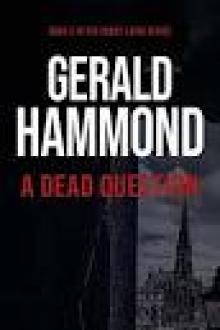 A Dead Question
A Dead Question Twice Bitten
Twice Bitten The Curse of the Cockers
The Curse of the Cockers In Loving Memory
In Loving Memory Illegal Tender (Three Oaks Book 12)
Illegal Tender (Three Oaks Book 12) Cold Relations (Honey Laird Book 1)
Cold Relations (Honey Laird Book 1)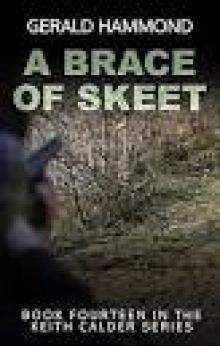 A Brace of Skeet
A Brace of Skeet Silver City Scandal
Silver City Scandal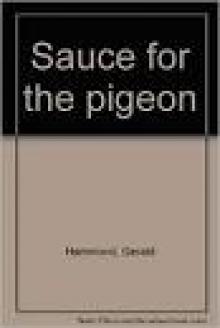 Sauce For the Pigeon
Sauce For the Pigeon Cold Relations
Cold Relations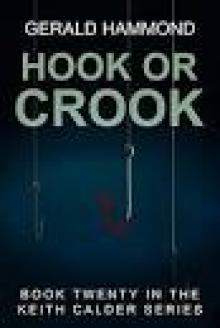 Hook or Crook
Hook or Crook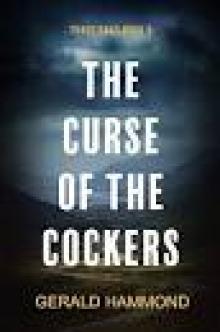 The Curse of the Cockers (Three Oaks Book 5)
The Curse of the Cockers (Three Oaks Book 5)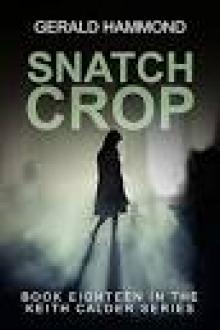 Snatch Crop
Snatch Crop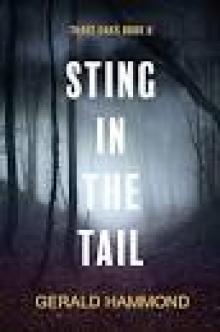 Sting in the Tail (Three Oaks Book 6)
Sting in the Tail (Three Oaks Book 6)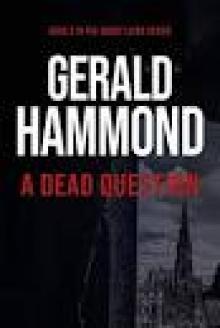 A Dead Question (Honey Laird Book 2)
A Dead Question (Honey Laird Book 2)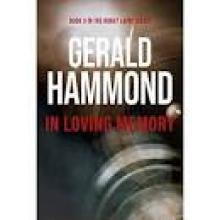 In Loving Memory (Honey Laird Book 3)
In Loving Memory (Honey Laird Book 3) Thin Air
Thin Air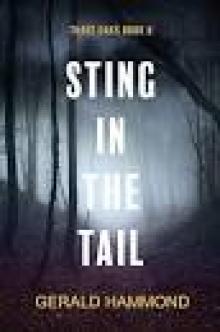 Sting in the Tail
Sting in the Tail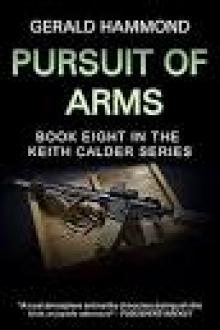 Pursuit of Arms
Pursuit of Arms The Game
The Game Give a Dog a Name (Three Oaks Book 4)
Give a Dog a Name (Three Oaks Book 4) Fair Game
Fair Game The Executor (Keith Calder Book 10)
The Executor (Keith Calder Book 10) Whose Dog Are You? (Three Oaks Book 2)
Whose Dog Are You? (Three Oaks Book 2) Mad Dogs and Scotsmen (Three Oaks Book 7)
Mad Dogs and Scotsmen (Three Oaks Book 7) Cousin Once Removed
Cousin Once Removed The Worried Widow
The Worried Widow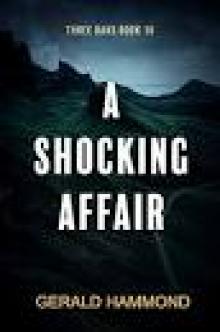 A Shocking Affair
A Shocking Affair Dead Weight (Three Oaks Book 11)
Dead Weight (Three Oaks Book 11) Whose Dog Are You
Whose Dog Are You The Revenge Game
The Revenge Game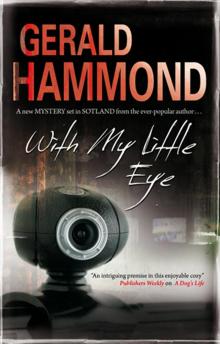 With My Little Eye
With My Little Eye Doghouse (Three Oaks Book 3)
Doghouse (Three Oaks Book 3)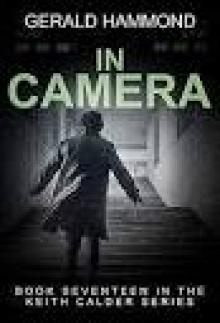 In Camera
In Camera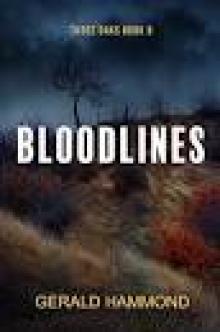 Bloodlines (Three Oaks Book 8)
Bloodlines (Three Oaks Book 8)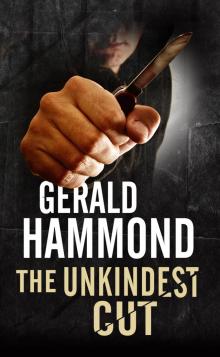 The Unkindest Cut
The Unkindest Cut